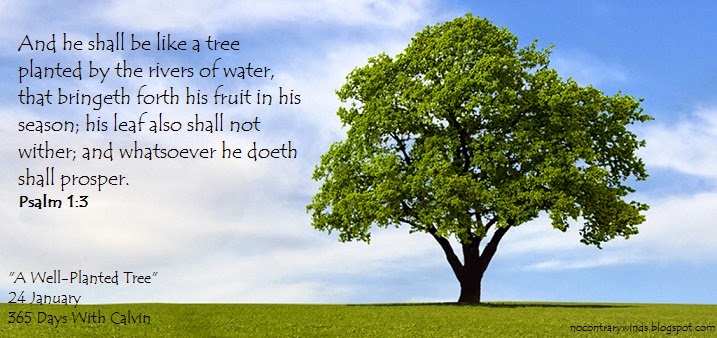24 January
And he shall be like a tree planted by the rivers of water, that bringeth forth his fruit in his season; his leaf also shall not wither; and whatsoever he doeth shall prosper.
Psalm 1:3
SUGGESTED FURTHER READING: 1 Kings 3:5-14
The psalmist here uses a metaphor to confirm the statement he made in the preceding verse. He shows us how those who fear God are to be accounted happy, not because of an evanescent and empty gladness, but because of their desirable condition. These words imply a contrast between the vigor of a tree planted in a well-watered area, and the condition of one that flourishes beautifully for a time, yet soon withers because of the barrenness of the soil in which it is placed.
The ungodly are sometimes like the cedars of Lebanon (Ps. 37:35). They have such an overflowing abundance of wealth and honor that they seem to lack nothing. But however high they may arise, and however far and wide they may spread their branches, they are poorly rooted in the ground and lack enough moisture to derive nourishment. So eventually their beauty withers away. Only the blessing of God can preserve and prosper those whom He plants.
God also allows the godly to bring forth fruit in season, the psalmist says, meaning that the children of God will flourish by being watered with the secret influences of divine grace, so that whatever befalls them is conducive to their salvation. The ungodly, on the other hand, will be carried away by a sudden storm or consumed by scorching heat. The godly will also bring forth fruit in their season, meaning that the fruit they produce will be fully mature. The ungodly, by contrast, may appear to be producing fruit but in the end will produce nothing that comes to perfection.
John Calvin
FOR MEDITATION: We often read of men and women who do not fear God and yet seem to be prospering. But in time, their leaves will wither and their fruits will not ripen to perfection. Consider the bigger picture before envying those who do not believe in God.
365 Days With Calvin
Selected and Edited by Joel R. Beeke


No comments:
Post a Comment